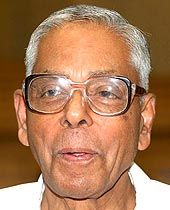 | « Back to article | Print this article |
 Underlining that India and China are to an extent destined by geography to be 'rivals', West Bengal Governor and former National Security Advisor M K Narayanan on Thursday said Beijing's increasing assertiveness on its part while dealing with disputes is 'most disconcerting'.
Underlining that India and China are to an extent destined by geography to be 'rivals', West Bengal Governor and former National Security Advisor M K Narayanan on Thursday said Beijing's increasing assertiveness on its part while dealing with disputes is 'most disconcerting'.
He also said Chinese activities in Pakistan Occupied Kashmir and its 'not-so-subtle wooing' of some of India's neighbours to New Delhi's detriment is a matter of concern.
Narayanan added that potential for a conflict also exists as competition between India and China for new energy sources intensify.
"To some extent, China and India are destined by geography to be rivals: neighbours with large populations, old civilisations, rich and venerable cultures, and disputes with regard to their borders," Narayanan, who is also a former chief of the Intelligence Bureau said in his keynote address at the annual Australia India Institute conference on India in Melbourne.
"The two countries are, nevertheless, far apart civilisationally and in their makeup," he said adding that 'elected accountability in India is an important point of difference'.
Addressing the large gathering, Narayanan said strategic rivalries were on the rise in Asian region. Most analysts see the main rivalry in Asia as being between India and China though both countries disclaim the existence of such rivalry, he said.
Moreover, Chinese scholars appear unable to comprehend the true nature of India's ethnic, religious, ideological and economic makeup.
The strident claims made by Chinese academics and strategic thinkers for Chinese exceptionalism hardly helps, Narayanan, who was also involved in negotiations for resolving boundary disputes with China said.
He drew a stark contrast between the two Asian nations by stating that while the Chinese economy was assessed today as the second largest in the world with its GDP at $10 trillion and is still growing, India's economic performance has not been of the same order.
"What is, however, most disconcerting today -- as China's economic muscle expands --is increasing assertiveness on its part while dealing with disputes, whether on land or sea," Narayanan said.
The West Bengal governor said, "China's activities in Pakistan Occupied Kashmir are very troubling for India. Its not-so-subtle wooing of some of India's neighbours to India's detriment is a cause of concern".
From India's viewpoint, some of China's recent moves are aggravating the existing trust deficit, he said. He said the strategic fallout of China's policy of building advantageous power relationships on India's periphery and beyond, is 'forcing' India to sit up and take notice.
"Potential for a conflict also exists as competition between India and China for new energy sources intensifies, with China moving aggressively into West Asia and elsewhere," he added.
Both countries are, however, conscious of possible miscalculations. Both are anxious to lower the threshold of concern, he said, while noting that border remained quiet with several other structures in place for discussion and negotiations.
Narayanan also referred to perceived rivalry with Pakistan and said the challenge that India faced in dealing with Pakistan was very different from that it faces in its dealings with China.
"India's desire for improvement in relations stems from its belief that a friendly neighbourhood will enhance India's capacity for growth and fulfilment of many of its objectives," he said.
"India cannot possibly rest easy unless there is a distinct change in Pakistan's attitude. Pakistan possesses one of the world's biggest armies, one that is equipped with a rapidly growing nuclear arsenal," he said.
He pointed out that for years, Pakistan has employed asymmetric warfare as a strategic instrumentality to keep India off balance.
There does not, hence, appear to be any easy or quick solution to the prevailing standoff, but the search for a modus vivendi continues, he said.